Reception
Some commentators have seen references in the song to Bowie's half-brother Terry Burns, who suffered from schizophrenia, while others such as Tom Robinson have discerned a "gay agenda". [3] Bowie himself admitted in 1977 that it was "very much based on myself and my brother" and in 2000 he elaborated that it was "another vaguely anecdotal piece about my feelings about myself and my brother, or my other doppelganger. I was never quite sure what real position Terry had in my life, whether Terry was a real person or whether I was actually referencing another part of me, and I think 'Bewlay Brothers' was really about that." [4]
In 2008 Bowie revealed that "Bewlay" was taken from the tobacconist shop chain, House of Bewlay. This he used as "a cognomen - in place of my own. This wasn't just a song about brotherhood so I didn't want to misrepresent it by using my true name. Having said that, I wouldn't know how to interpret the lyric of this song other than suggesting that there are layers of ghosts within it. It's a palimpsest, then". On another occasion he repeated that he "couldn't imagine what the person who wrote that had on his mind at the time". [5]
The coda features Bowie's voice distorted by varispeeding; NME critics Roy Carr and Charles Shaar Murray likened the effect to Bowie's earlier song "The Laughing Gnome", but "in considerably more sinister guise". [1]
Some of these hinted interpretations showed up in the analysis of a Rolling Stone magazine's Readers' Poll: The 10 Best David Bowie Deep Cuts, in which "Bewlay Brothers" came in at #8 (after such hits as "Panic in Detroit", "Station to Station", and "Teenage Wildlife"). [6] Compiler Andy Greene said,
Virtually no entry in the David Bowie songbook has confused the hardcores quite like "The Bewlay Brothers." It was the final track recorded for Hunky Dory and Bowie said at the time the lyrics were nonsense, but in later years he hinted it was inspired by his schizophrenic half-brother Terry. "I was never quite sure what real position Terry had in my life," he said in 2000, "whether Terry was a real person or whether I was actually referencing another part of me, and I think 'Bewlay Brothers' was really about that." Others have seen clear homosexual overtones in the surreal lyrics, but Bowie's never commented on that. He's also only played it five times, and those were all between 2002 and 2004.
John Mendelsohn of Rolling Stone magazine wrote, "'The Bewlay Brothers' sounds like something that got left off The Man Who Sold because it wasn't loud enough. Musically it's quiet and barren and sinister, lyrically virtually impenetrable — a stream-of-consciousness stream of strange and (seemingly) unrelated imagery — and it closes with several repetitions of a chilling chorus sung in a broad Cockney accent, which, if it's any help, David usually invokes when he's attempting to communicate something about the impossibility of ever completely transcending the mundane circumstances of one's birth." [7]
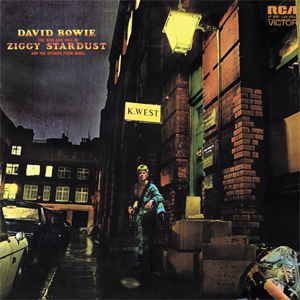
The Rise and Fall of Ziggy Stardust and the Spiders from Mars is the fifth studio album by the English musician David Bowie, released on 16 June 1972 in the United Kingdom through RCA Records. It was co-produced by Bowie and Ken Scott and features Bowie's backing band the Spiders from Mars — Mick Ronson, Trevor Bolder and Mick Woodmansey. It was recorded from November 1971 to February 1972 at Trident Studios in London.

Hunky Dory is the fourth studio album by the English musician David Bowie, released in the United Kingdom on 17 December 1971 through RCA Records. Following the release of his 1970 album, The Man Who Sold the World, Bowie took time off from recording and touring. He settled down to write new songs, composing on piano rather than guitar as on earlier tracks. Following a tour of the United States, Bowie assembled a new backing band consisting of guitarist Mick Ronson, bassist Trevor Bolder and drummer Mick Woodmansey, and began to record a new album in mid-1971 at Trident Studios in London. Future Yes member Rick Wakeman contributed on piano. Bowie co-produced the album with Ken Scott, who had engineered Bowie's previous two records.

"Life on Mars?" is a song by the English singer-songwriter David Bowie, first released on his 1971 album Hunky Dory. Bowie wrote the song as a parody of Frank Sinatra's "My Way". "Life on Mars?" was recorded on 6 August 1971 at Trident Studios in London, and was co-produced by Bowie and Ken Scott. Bowie's backing band consisted of guitarist and string arranger Mick Ronson, bassist Trevor Bolder, drummer Mick Woodmansey and Strawbs member Rick Wakeman on piano. "Life on Mars?" is primarily a glam rock ballad, with elements of cabaret and art rock; it has a complex structure that includes chord changes throughout. The lyrics are about a girl who goes to a cinema to escape reality, and include surreal images that reflect optimism and the effects of Hollywood.

The Man Who Sold the World is the third studio album by the English musician David Bowie, originally released through Mercury Records in the United States on 4 November 1970 and in the United Kingdom on 10 April 1971. Produced by Tony Visconti and recorded in London from April to May 1970, the album features the first appearances on a Bowie record of future Spiders from Mars members Mick Ronson and Mick Woodmansey.
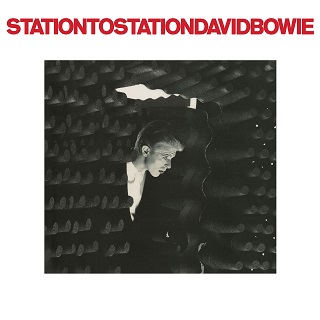
Station to Station is the tenth studio album by the English musician David Bowie, released on 23 January 1976 through RCA Records. Regarded as one of his most significant works, the album was the vehicle for Bowie's performance persona the Thin White Duke. Co-produced by Bowie and Harry Maslin, Station to Station was mainly recorded at Cherokee Studios in Los Angeles, California, in late 1975, after Bowie completed shooting the film The Man Who Fell to Earth; the cover art featured a still from the film. During the sessions, Bowie was dependent on drugs, especially cocaine, and later said that he recalled almost nothing of the production.

"Heroes" is the 12th studio album by the English musician David Bowie, released on 14 October 1977 through RCA Records. Recorded in collaboration with musician Brian Eno and producer Tony Visconti, it was the second release of his Berlin Trilogy, following Low, released in January the same year, and the only one wholly recorded in Berlin. Sessions took place in mid-1977 after Bowie completed work on Iggy Pop's second solo album Lust for Life. Much of the same personnel from Low returned for "Heroes", augmented by King Crimson guitarist Robert Fripp.

"Rebel Rebel" is a song by the English singer-songwriter David Bowie. It was released in the UK in February 1974 by RCA Records as the lead single from the album Diamond Dogs. Written and produced by Bowie, the song is based around a distinctive guitar riff reminiscent of the Rolling Stones. Cited as his most-covered track, "Rebel Rebel" has been described as Bowie's farewell to the glam rock movement that he had helped initiate, as well as being a proto-punk track. Two versions of the song were recorded: the well-known UK single release and the shorter US single release, which featured added background vocals, extra percussion and a new arrangement.

Hours is the 22nd studio album by the English musician David Bowie. It was originally released on 21 September 1999 through the Internet on the artist's website BowieNet, followed by a physical CD release on 4 October through Virgin Records. It was one of the first albums by a major artist available to download over the Internet. Originating as a soundtrack to the video game Omikron: The Nomad Soul (1999), Hours was the final collaboration between Bowie and guitarist Reeves Gabrels, with whom he had worked since 1988. The album was recorded in mid-1999 between studios in Bermuda and New York City. A song contest conducted on BowieNet in late 1998 resulted in a fan contributing lyrics and backing vocals to one of the tracks.
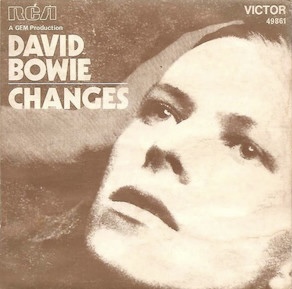
"Changes" is a song by the English singer-songwriter David Bowie from his 1971 album Hunky Dory. RCA Records then released it as a single from the album on 7 January 1972. Written following his promotional tour of America in early 1971, "Changes" was recorded at Trident Studios in London between June and July that year. Co-produced by Bowie and Ken Scott, it featured Rick Wakeman on piano and the musicians who would later become known as the Spiders from Mars—Mick Ronson, Trevor Bolder and Mick Woodmansey.
"Aladdin Sane (1913–1938–197?)" is a song by the English singer-songwriter David Bowie, the title track from his 1973 album Aladdin Sane. Described by biographer David Buckley as the album's "pivotal" song, it saw Bowie moving into more experimental musical styles following the success of his breakthrough glam rock release The Rise and Fall of Ziggy Stardust and the Spiders from Mars in 1972.
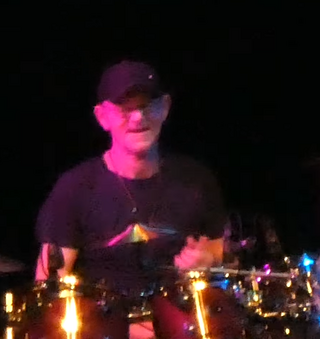
Michael "Woody" Woodmansey is an English rock drummer best known for his work in the early 1970s as a member of David Bowie's core backing ensemble that became known as the Spiders from Mars in conjunction with the release of Bowie's 1972 LP The Rise and Fall of Ziggy Stardust and the Spiders from Mars. With the death of Bowie in January 2016, Woodmansey became the last surviving member of the Spiders.
"The Supermen" is a song written by the English singer-songwriter David Bowie in 1970 and released as the closing track on the album The Man Who Sold the World. It was one of a number of pieces on the album inspired by the works of literary figures such as Friedrich Nietzsche and H. P. Lovecraft.
"Oh! You Pretty Things" is a song by the English singer-songwriter David Bowie from his 1971 album Hunky Dory. It was the first song he wrote for the album. Bowie recorded the song as a demo before giving it to singer Peter Noone, lead singer of Herman's Hermits, who decided to release it as his debut solo single. Featuring Bowie on piano, Noone's recording was produced by Mickie Most and featured structural and lyrical differences from Bowie's later version. Released by RAK Records in April 1971 under the title "Oh! You Pretty Thing", the single peaked at number 12 in the UK, becoming Bowie's biggest success as a songwriter since his own single "Space Oddity" two years earlier.
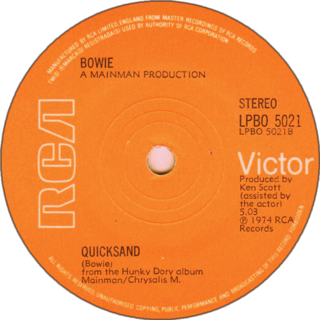
"Quicksand" is a song written by the English singer-songwriter David Bowie and released on his 1971 album Hunky Dory.
"Song for Bob Dylan" is a song written by the English singer-songwriter David Bowie for his 1971 album Hunky Dory. The song references Bob Dylan's 1962 homage to Woody Guthrie, "Song to Woody". Yet while Dylan opens with "Hey, hey, Woody Guthrie, I wrote you a song," Bowie addresses Dylan by his birth name saying, "Now, hear this, Robert Zimmerman, I wrote a song for you."

"Queen Bitch" is a song by the English singer-songwriter David Bowie. It was originally released on his 1971 album Hunky Dory before appearing as the B-side of the single "Rebel Rebel" in the United Kingdom in early 1974. Co-produced by Bowie and Ken Scott, the lineup consisted of the musicians who would later become known as the Spiders from Mars: Mick Ronson, Trevor Bolder and Mick Woodmansey.
"Bombers" is a song written by English singer-songwriter David Bowie. It was recorded in July 1971 and intended for the album Hunky Dory, but was replaced at the last minute by the cover "Fill Your Heart".
"Big Brother" is a song written by David Bowie in 1973 and intended for his never-produced musical based on George Orwell's Nineteen Eighty-Four. In 1974 it was released on the album Diamond Dogs. It segued into the final track on the record, "Chant of the Ever Circling Skeletal Family".
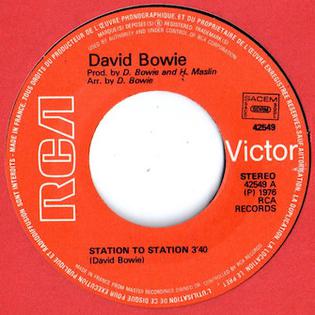
"Station to Station" is a song by the English musician David Bowie. It was released in January 1976 as the title track and opener of his tenth studio album Station to Station, as well as on a promotional 7-inch single in France the same month. Co-produced by Bowie and Harry Maslin, it was written and recorded at Cherokee Studios in Los Angeles between September and November 1975. At over 10 minutes in length, it is Bowie's longest studio recording. Opening with a train-like noise, the song's first half is a slow march, built around an atonal guitar riff, while the second half takes the form of a prog-disco suite in a different key and tempo than the first. It has been characterised as art rock and is influenced by the German electronic bands Kraftwerk and Tangerine Dream.

"Survive" is a song by the English musician David Bowie from his 1999 album Hours. It was later released in remixed form as the album's third single on 17 January 2000, reaching number 28 in the UK. Written by Bowie and Reeves Gabrels, it is a reflective number detailing the end of a relationship. Musically, it recalls the sound of Bowie's folk rock music of the late 1960s, and 1971's Hunky Dory. Its music video echoes the reflective quality of the recording, portraying Bowie levitating at a kitchen table with an egg. Praised as a highlight of Hours, Bowie performed "Survive" frequently through 1999 and 2000.














